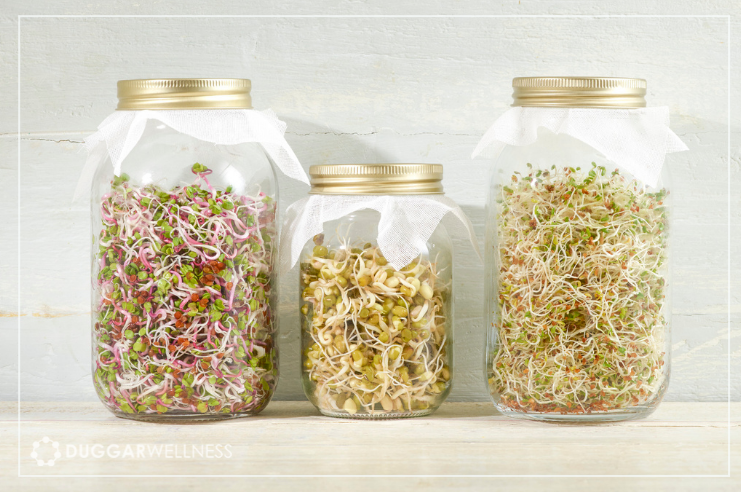What is a Sprout?
A seed or legume and even grains are composed of nutrients, micro nutrients: vitamins and minerals that are beneficial to our health. Many of these nutrients are locked up tight by enzyme inhibitors, like Phytic acid. It’s almost like a mini treasure chest, but you have to be able to find the right key to open it. Enzyme inhibitors are there to protect the seed until it is in the right environment to become a plant.
Once the seed is in a favorable environment the germination process begins and the dormant seed casts away the enzyme inhibitors and begins to become a plant.
Do Enzyme Inhibitors Affect the Nutrient Availability of Seeds?
Phytic acid binds with micro nutrients like calcium, magnesium, iron, copper, and zinc, making it nearly impossible for you to absorb those nutrients. It also causes irritation to your digestive system. When seeds are sprouted they are easier to be digested and the bound nutrients are able to be absorbed by the body.
Sprouts contain large doses of chlorophyll. In plants, chlorophyll is the substance that makes them green. In humans, chlorophyll keeps our blood healthy because it is a powerful blood cleanser and builder. It replenishes and increases red blood cells and the ability of the red blood cell to carry and deliver oxygen. Chlorophyll also reduces inflammation, calms the nervous system, revitalizes tissues, and balances the pH levels in our body.
Not only are the micro nutrients more available when seeds are sprouted, so are the macro nutrients. Macro nutrients are fat, protein and carbohydrates. Soaking breaks down some of the fat, converts the protein into simple amino acids and starts to breakdown the complex carbohydrates into simpler molecules. When all of this happens before the seed even gets into your body it lowers the burden placed on the digestive system and increases the ability of your body to use these macro nutrients more efficiently.
Sprouts Aid in Digestion
Raw plant based foods contain valuable enzymes that we need to help break down the food we eat. Our body produces digestive enzymes but not enough to properly digest everything we eat, that’s why it is important to eat foods that contain enzymes. Spouts have up to 100 times more enzymes than other raw fruits and vegetables.
Why Should I Sprout?
Sprouting in your kitchen is like having a nutrient rich mini garden in the house year round. Sprouts are baby plants in their prime. During this stage they actually have a greater concentration of proteins, vitamins, minerals and enzymes than at any other point in their lifecycle.
Sprouts are easy to grow. All you need to do is provide the right conditions and let them do their thing. Maybe you haven’t tried spouting before because you thought it was going to be a complicated process or you just didn’t have the right equipment, it’s easy- give it a try!
Try one of these methods and discover just how easy it is.



 160 N Main, Bountiful, UT 84010
160 N Main, Bountiful, UT 84010  801-677-7878
801-677-7878




3 responses to “Sprouts- Tiny plants with giant nutrition”
[…] sulfur-containing compounds. These compounds are what gives cruciferous vegetables like cabbage, sprouts, and cauliflower their signature smell when they are […]
[…] This method is good for sprouting mung beans, garbanzo beans, lentils and buckwheat. Depending on the size of the holes in your strainer you can also sprout quinoa, broccoli sprouts, and alfalfa sprouts too. Click here to learn about sprouts and other sprouting methods. […]
[…] This method is good for sprouting sunflower seeds, wheat grass, Swiss chard and arugula. Click here to learn about sprouts and other sprouting methods. […]